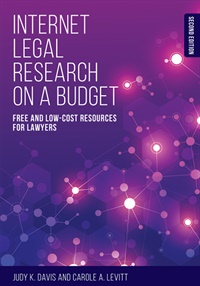
- Faculty:
- Mark Rosch | Carole Levitt
- Duration:
- 1:00
- Short Description:
- More and more attorneys and judges are using social media, either for its intended purpose of social networking (and, for the lesser intended purpose of marketing) or for its unintended purpose of investigative research. There has been much discussion online amongst legal experts about what sorts of investigative activity is ethical for lawyers to engage in. Most Bar Associations however, have not yet addressed this topic. Two exceptions are the Philadelphia Bar and the New York State Bar.

- Faculty:
- Carole Levitt | Judy K. Davis, Esq
- Duration:
- 1:04
- Format:
- Audio and Video
- Short Description:
- With cost-conscious clients scrutinizing legal bills, lawyers cannot afford to only depend on fee-based resources the way they used to, especially if there are reliable free resources available. The speakers will point lawyers to useful and reliable Internet legal research resources, which are either free or low cost. They will explain how to use various resources effectively so you can become ...

- Author:
- Judy K. Davis, Esq | Carole Levitt
- Publication Date:
- May 26, 2020
- Short Description:
- Internet Legal Research on a Budget directs lawyers to useful and reliable free (and low-cost) resources and explains how to use them effectively. This edition has updated information about resources discussed in the first edition, new resources, and expanded chapters on Casemaker and Fastcase.

- Faculty:
- Mark Rosch | Carole Levitt
- Duration:
- 1:00
- Short Description:
- Lawyers looking for evidence need to start thinking about looking "virtually." With increasing amounts of "paperless" information being added to the Internet every minute of every day, there is an increasing chance lawyers could find potentially relevant evidence there. Evidence to prove or refute a point in contention, get the upper hand in a settlement conference, or decide w

The Cybersleuth's Guide to the Internet
Conducting Effective Internet Investigative and Background Research
- Author:
- Mark Rosch | Carole Levitt
- Short Description:
- Short Description

- Faculty:
- Mark Rosch | Carole Levitt
- Duration:
- 1:03
- Format:
- Audio and Video
- Short Description:
- Learn how to conduct free Internet legal and investigative research. This webinar unlocks the mysteries of Google Scholar, the least documented legal research database you’ll ever see…until now.
Please wait ...

